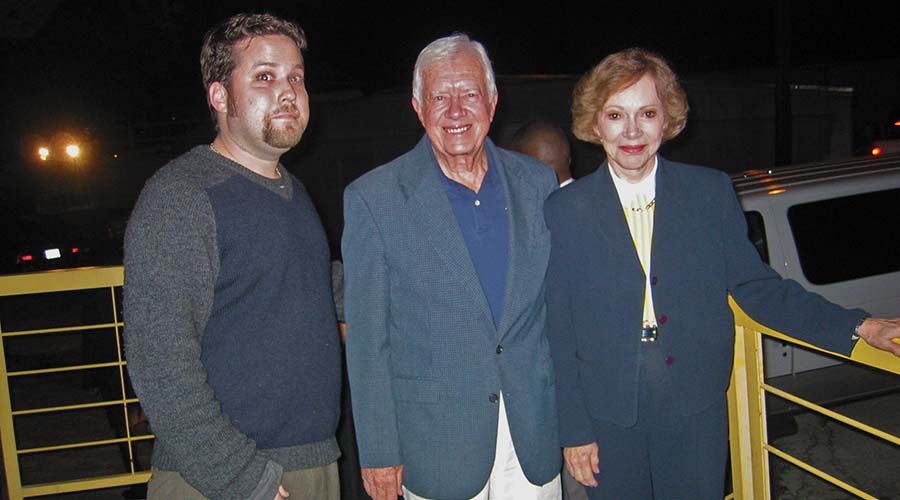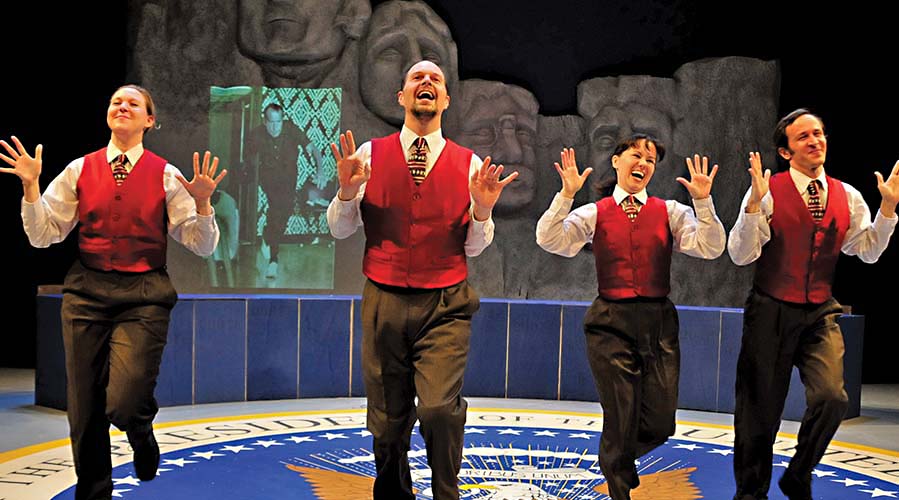Challenge: To write a history play about all the presidents and inspire civic action during election time.
Plan: Hire five writers from the Neo-Futurists, draw presidents’ names, and set to work writing two-minute plays about each one.
What Worked: A diverse group of writers allows for a plurality of opinion, two-minute plays keep things snappy, and partnering with Rock the Vote gets people voting.
What Doesn’t: Propaganda.
What’s Next: 2020 is closer than you think.
In the wake of the hotly contested 2000 Bush/Gore election, I often silently consoled myself with the refrain: “I would have voted for Ralph Nader anyway.”
I didn’t vote, and I don’t know why.
Was it youthful hubris? My disinterest in driving and hence lack of a driver’s license? My difficulty in adjusting to my freshman year of college?
It’s not like I wasn’t civic-minded. I had taken A.P. U.S. History. I had worked on Boston’s Freedom Trail. I grew up in a bastion of progressive, liberal-minded people, for crying out loud! Brookline, Mass.—the birthplace of John F. Kennedy. Walking to school as a youngster, I’d exchange hellos with presidential candidate Michael Dukakis.
And yet I didn’t cast my ballot in 2000. Was I contrary or just plain clueless? Would I have acted differently if I’d seen a play about all the presidents and the potential Bush/Gore outcomes? Not voting that year is a secret shame I’ve carried for years, and as this election cycle draws near, I want to shake my former 18-year-old self and say, “Just vote, darnit!”
“It always seems like every election is the most important one in our lives,” says director Sean Daniels, offering me another way to absolve myself (if every one is the most important, then none can be more important than another, right?). This month Daniels directs 45 Plays for 45 Presidents at Merrimack Repertory Theatre, where he is artistic director, in Lowell, Mass. As the most-important-election thing actually seems truer than usual this time, he and I share a nervous laugh for what lays ahead.
This is Daniels’s fourth time helming the show, which began as 43 Plays for 43 Presidents in 2002 at Chicago’s Neo-Futurists. Five ensemble members—Andy Bayiates, Sean Benjamin, Genevra Gallo-Bayiates, Chloë Johnston, and Karen Weinberg—picked presidents’ names from a hat, then went and wrote two-minute playlets about each president. At the end of the show, the audience must vote on the next phase of the narrative: a Democratic or a Republican finale. Although past presidents are divvied up among the playwrights, the group cowrites the potential endings and updates recent presidential narratives as the years pass.
History may repeat itself, but these short plays encompass a variety of styles and tones: There are sad, poetic moments, raucous dance numbers, silly songs, and everything in between.
“It’s fascinating how the same mistakes play out over and over again, but it’s also interesting to think about how many of the things that define us were put into place 30 and 40 years ago,” Daniels observes. “With the financial collapse in 2008, it was interesting to note how President Wilson was the one who deregulated banks. You don’t often get that perspective.”
In that same year, Daniels notes, “Obama won all the night shows. McCain won all the matinees. I wonder what that says about audiences. Four years ago, Obama won all the shows. We did the Romney play at one point just to do it.”
Iterations of 45 Plays have bowed in Chicago, where it premiered, and at scores of high schools and colleges around the country. Resident theatres have also hosted the show; Daniels has directed the piece at Dad’s Garage in Atlanta, Actors Theatre of Louisville in Kentucky, and Geva Theatre Center in Rochester, N.Y. In October, Cleveland Public Theatre will stage 44 Plays with an all-female cast.
“All politics is local,” observes Daniels. “So is theatre.”
For example, four days after Jimmy Carter won the Nobel Prize in 2002, he and his wife, Rosalind, came to the Atlanta theatre Dad’s Garage to take in 43 Plays for 43 Presidents. Sean Benjamin, the writer who wrote the Carter playlet, wrote in a script note, “My favorite president ever. And my favorite ex-president ever.” The ex-prez seemed happy with the result; despite the extra security at the venue, Carter spent the intermission shaking hands and thanking audiences for supporting the arts in Georgia. In the second half of the play, Daniels notes, “There’s a Reagan dance for arms and hostages. When Carter laughed, everyone laughed.”
In 2008 at Actors Theatre, Daniels remembers the palpable tension between supporters of Obama and McCain. “Democrats don’t even campaign in Kentucky because it’s so red,” he says. Meanwhile, while Massachusetts may be bluer than blue, Lowell played host to the only Trump rally to happen in the Bay State. “There are Trump signs I drive past on my way to work,” notes Daniels. “I’m sure Trump’s team was strategic in having the rally here, so there’s an interesting mix in the audience.”

The plays do not skew as “theatre liberal” as one might expect. “The writers don’t all share the same views, so there are multiple entry points into the material,” Daniels says. Moreover, theatres often schedule civic-minded conversations and post-show discussions that have voices from various points on the political spectrum.
“Everyone pretty much feels the same about the first 16 presidents,” says Daniels. “What’s great about the writers is they share a similar Neo-Futurist aesthetic. It allows us to tell 45 stories and encourages a dangerously honest performance style.”
For the authors, not letting their own opinions enter into how they tackled the presidents in two minutes was tough.
“Our approach was similar to a journalist’s: You’re aware of your bias and you do your best to look past it and be fair,” says Andy Bayiates. If anything, Bayiates admits, “The need to turn real life—which is nothing like a story—into a story is the most egregious bias in the show.” Nevertheless, emotional responses and personal preference guide the ongoings. “Why did I portray Franklin Pierce’s presidency as a tragic story…and from his wife’s perspective?” Bayiates wonders, adding that voting for a leader is personal too. “It was just something that moved me personally.”
And while a number of the presidents’ legacies are murky, the writers attempt to do their lives justice. “It always seemed so sad that someone would take on such a big task—one which they had no doubt worked very hard to attain—and ultimately have no one remember you,” says Genevra Gallo-Bayiates.
Over the years the personal politics of Gallo-Bayiates and Bayiates have not changed, but it’s fair to say the parties have moved further apart since 2002. “That’s making it harder to rework the ending,” says Bayiates. “How do you find truth between two stories running in opposite directions? Maybe that’s the story.”
In case reluctant voters like my 18-year-old self don’t get the message, Daniels has partnered with Rock the Vote so that audiences can register to vote on site after the show. This year, there will also be mobile registration for those with smartphones. As Bayiates puts it, 45 Presidents is ultimately a celebration of the power of democracy and “the innate power of each citizen to shape the future through their vote.”
Lesson learned!
New York City-based playwright and performer Eliza Bent is a former senior editor of this magazine.


